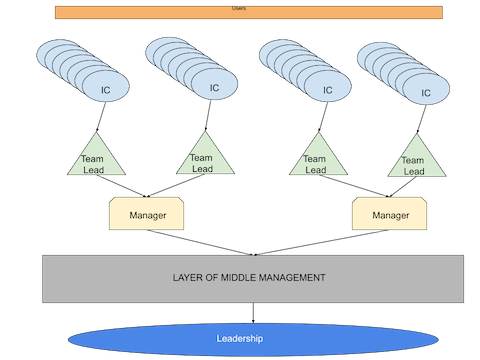The Tyranny of Middle Management
Over the past two decades we’ve see nteh continual rise of the “disruptive” start-up versus the behemoth enterprise and cheered for the agility and flexibility of the “little one” while deriding the glacial pace and stodginess of old reliable colossus.
But it seems many late-stage startups and startups that have grown into the behaviors we always attribute to the enterprises, things like sudden force reduction, manipulation of products for board fit as opposed to customer or client requests, and speculating on what end-users of a product want and need without ever interacting with them. What is the cause of these lean toward outdated methods and rigid adherence to the bottom-line?
While everything has multiple contributing factors, the one we’ll focus on here is Middle Management.
First, let’s define middle management: he middle tier of management, usually including lower executives and employees who manage supervisors overseeing day-to-day operations. Basically, anyone between the decision makers at the top and the people dealing with day-to-day operations. So in a basic hierarchy, we’d have something like this:

It’s the “Layers of Middle Management” section we should be concerned about. Many companies have this, though it is never more evident than in the large multi-national corporation. Here you will have all kinds of Regional, Country-based, Project, Product, Content, Brand, and Sales managers of varying sizes - from one or two to thousands. If these people are neither making decisions nor interacting with users, what is their purpose other than to create process where things can be automated, to build meetings where emails could resolve it?
These are the folks that are tossing around the importance of a Net Promoter Score yet have never used nor talked to anyone who uses the product or service. This is what kills the hear of bigger organizations. And it’s what’s starting to kill growing start-ups as well.
Take a streaming service for example. Less than 10,000 employees, operating on multiple continents, known everywhere. Of those 10,000 employees, 6 or 7 sit at the top level, in the C-suite. Probably five to six thousand are ICs. Those ICs probably have a thousand managers and directors. That still leaves about three thousand people in the middle - doing what exactly? Just funneling information up and down? Seems like that shouldn’t be necessary.
When the company looks to meet spending, instead of trimming this fat layers of well-paid middle managers, they cut about 2000 ICs and their managers and directors. That layer of middle managers grows creating a cycle of people sustaining themselves for the purpose of having a job. It’s what’s draining the company but the c-levels don’t see that, they see what the enterprises they idolize (and secretly long to be) have done and follow suit.
Six months later the CEO wonders why they’ve lost subscribers and why the quality of their app is noticeable worse.
The issue here is we need a new way of working that doesn’t focus on meme metrics and useless busy work. Most of what middle management does could be automated or, if we can put our obsession with the world ending if my app doesn’t work aside, we could time to get things done in order to not meet arbitrary deadlines (usually created by middle management).
Entrepreneurs, investors, creators, builders, and business owners, let’s work toward making the lives our workers better without forcing layers of pointless middle management down the pipe. This is not to deride the people doing work out there, it is simply to point out there are better ways of doing work.
